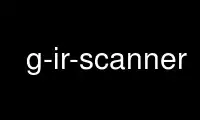
This is the command g-ir-scanner that can be run in the OnWorks free hosting provider using one of our multiple free online workstations such as Ubuntu Online, Fedora Online, Windows online emulator or MAC OS online emulator
PROGRAM:
NAME
g-ir-scanner - extracting C metadata from sources and headers
SYNOPSIS
g-ir-scanner [OPTION...] FILES...
DESCRIPTION
g-ir-scanner is a tool which generates GIR XML files by parsing headers and introspecting
GObject based libraries. It is usually invoked during the normal build step for a project
and the information is saved to disk and later installed, so that language bindings and
other applications can use it. Header files and source files are passed in as arguments
on the command line. The suffix determines whether a file be treated as a source file
(.c) or a header file (.h). Currently only C based libraries are supported by the scanner.
OPTIONS
--help Show help options
--quiet
If passed, do not print details of normal operation.
--warn-all
Display warnings for public API which is not introspectable.
--warn-error
Make warnings be fatal errors.
--format=FORMAT
This parameters decides which the resulting format will be used. The default value
is gir.
--include=NAME
Add the specified introspection dependency to the scanned namespace. NAME is of
the form NAMESPACE-VERSION, like Gtk-3.0.
--include-uninstalled=PATH
Add the specified introspection dependency to the scanned namespace. This differs
from --include in that it takes a file path, and does not process the pkg-config
dependencies (since they may not be installed yet).
--add-include-path=PATH
Add a directory to the path which the scanner uses to find GIR files. Can be used
multiple times to specify multiple directories
-i, --library=LIBRARY
Specifies a library that will be introspected. This means that the *_get_type()
functions in it will be called for GObject data types. The name of the library
should not contain the leading lib prefix nor the ending shared library suffix.
-L, --library-path=PATH
Include this directory when searching for a library. This option can be specified
multiple times to include more than one directory to look for libraries in.
-Idirectory
Include this directory in the list of directories to be searched for header files.
You need to pass to the scanner all the directories you'd normally pass to the
compiler when using the specified source files.
-n, --namespace=NAME
The namespace name. This name should be capitalized, eg the first letter should be
upper case. Examples: Gtk, Clutter, WebKit.
--no-libtool
Disable usage of libtool for compiling stub introspection binary. Use this if your
build system does not require libtool.
--libtool
Full path to libtool executable. Typically used for Automake systems.
--nsversion=VERSION
The namespace version. For instance 1.0. This is usually the platform version, eg
2.0 for Gtk+, not 2.12.7.
-p, --program=PROGRAM
Specifies a binary that will be introspected. This means that the *_get_type()
functions in it will be called for GObject data types. The binary must be modified
to take a --introspect-dump= option, and to pass the argument to this function to
g_irepository_dump.
--program-arg=ARG
Additional argument to pass to program for introspection.
--identifier-prefix=PREFIX
This option may be specified multiple times. Each one gives a prefix that will be
stripped from all C identifiers. If none specified, the namespace will be used.
Eg, an identifier prefix of Foo will export the identifier typdef struct _FooBar
FooBar; as Foo.Bar.
--symbol-prefix=PREFIX
This option may be specified multiple times. Each one gives a prefix that will be
stripped from all C symbols. Eg, an symbol prefix of foo will export the symbol
foo_bar_do_something as Foo.Bar.do_something.
--accept-unprefixed
If specified, the scanner will accept identifiers and symbols which do not match
the namespace prefix. Try to avoid using this if possible.
--output=FILENAME
Name of the file to output. Normally namespace + format extension. Eg,
GLib-2.0.gir.
--pkg=PACKAGE
List of pkg-config packages to get compiler and linker flags from. This option can
be specified multiple times to include flags from several pkg-config packages.
--pkg-export=PACKAGE
List of pkg-config packages that are provided by the generated gir. This option
can be specified multiple times if the gir provides more packages. If not
specified, the packages specified with --pkg= will be used.
--verbose
Be verbose, include some debugging information.
ENVIRONMENT VARIABLES
The g-ir-scanner uses the XDG_DATA_DIRS variable to check for dirs, the girs are
located in XDG_DATA_DIRS/gir-1.0. It is normally set on a distribution so you
shouldn't need to set it yourself.
The variable GI_SCANNER_DISABLE_CACHE ensures that the scanner will not write cache
data to $HOME.
Use g-ir-scanner online using onworks.net services
